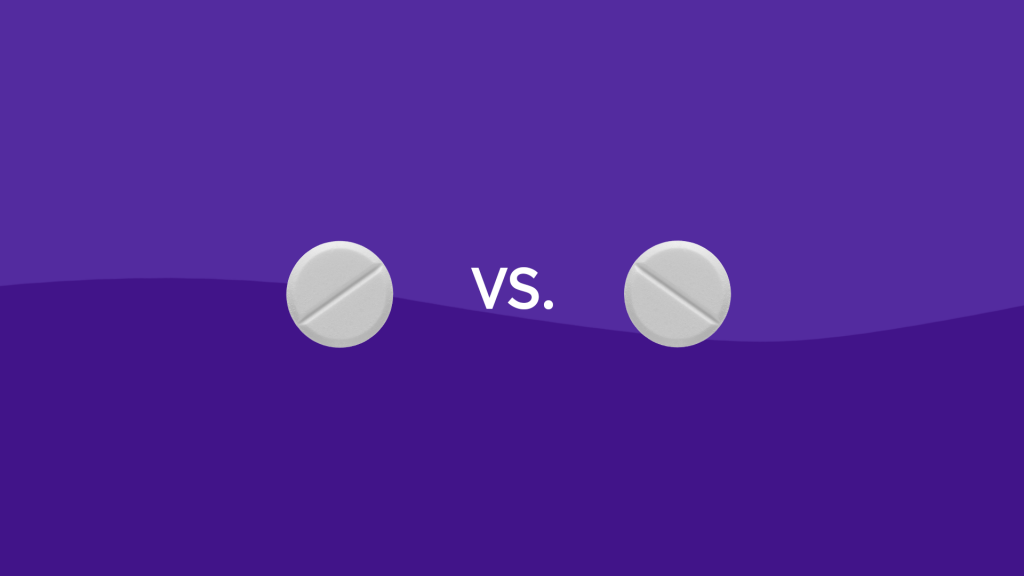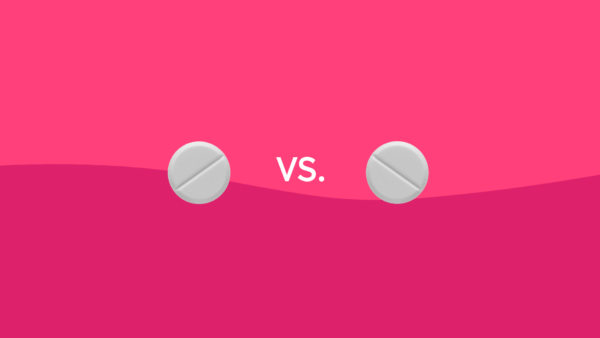Main differences | Conditions treated | Efficacy | Coverage and cost comparison | Side effects | Drug interactions | Warnings | FAQs
Acetaminophen vs. aspirin: Differences, Similarities, and Which One is Better For You
When it comes to relieving aches, pains, and fever, two of the most commonly used over-the-counter (OTC) medications are acetaminophen and aspirin. Both have been around for years, and both are considered safe and effective when used as directed. In addition, acetaminophen and aspirin are generic medications that may be found on shelves in various brand-name forms. They are sometimes combined with other medications to relieve symptoms of different ailments.
But what are the differences between these two medications, and which one is better for you? In this article, we will explore the similarities and differences between the two and help you decide which medication is best for your specific needs.
What are the main differences between acetaminophen and aspirin?
There are some important differences to know between acetaminophen and aspirin. They are part of different drug classes, have different brand names, and work in different ways.
Acetaminophen, commonly known by the brand name Tylenol, is a non-opioid analgesic (pain reliever) and antipyretic (fever reducer). The exact way in which it works is unknown, but it is believed to work by blocking pain signals in the central nervous system and interfering with the production of prostaglandins.
Aspirin is part of a group of medications called nonsteroidal anti-inflammatory drugs (NSAIDs). It works by blocking the production of prostaglandins that are involved with pain, inflammation, and fever. Aspirin is also known as acetylsalicylic acid (ASA), and it can be found under different brand names, including Bayer and Ecotrin.
| Acetaminophen | Aspirin | |
| Drug class | Non-opioid analgesic | Nonsteroidal anti-inflammatory drug
(NSAID) |
| Brand/generic status | Brand and generic versions available | Brand and generic versions available |
| What are the brand names? | Tylenol | Bayer, Ecotrin, Ecpirin, Halfprin, Bufferin, Durlaza, etc. |
| What form(s) does the drug come in? | Oral tablet
Oral capsule Oral liquid Rectal suppository |
Oral tablet
Chewable tablet Enteric coated tablets Oral capsule Rectal suppository |
| What is the standard dosage? | Mild to moderate pain relief and fever reduction: 325-650 mg every 4-6 hours
Dosage varies by indication |
Mild to moderate pain relief and fever reduction: 325-650 mg every 4-6 hours
Dosage varies by indication |
| How long is the typical treatment? | Short-term, usually up to 10 days; however, treatment duration can vary by indication | Short-term, usually up to 10 days; however, treatment duration can vary by indication |
| Who typically uses the medication? | Adults and children 6 months and older | Adults |
Conditions treated by acetaminophen and aspirin
Acetaminophen and aspirin are commonly used as pain relievers. They can treat mild pain and minor aches caused by menstrual cramps, migraine headaches, toothaches, and muscle aches.
As an NSAID, aspirin may be better for inflammatory pain caused by arthritis. However, higher doses of aspirin are generally needed for this use, which may increase the risk of side effects.
Aspirin also acts as an antiplatelet agent or blood thinner that prevents blood clots. At low doses, aspirin is used to reduce the risk of heart attack and stroke in people who have recently experienced a heart attack or stroke or those with heart disease.
| Condition | Acetaminophen | Aspirin |
| Pain | Yes | Yes |
| Fever | Yes | Yes |
| Acute coronary syndrome | No | Yes |
| Prevention of stroke | No | Yes |
| Prevention of heart attack | No | Yes |
| Prevention of atherosclerotic cardiovascular disease (ASCVD) | No | Yes |
Is acetaminophen or aspirin more effective?
Acetaminophen and aspirin can be effective OTC medications for pain and fever. The more effective medication will depend on the overall condition being treated. Aspirin may be more effective for pain caused by inflammatory conditions, but a higher dose may be needed, which can increase side effects.
Clinical studies have compared the effectiveness of acetaminophen and aspirin. One randomized, double-blind trial evaluated the use of acetaminophen and aspirin for pain after a dental procedure. Compared to placebo, acetaminophen and aspirin were found to be effective for pain relief. However, acetaminophen provided better maximum pain relief than aspirin.
Another study compared the use of acetaminophen and aspirin for fever and other symptoms of an upper respiratory tract infection. Equal doses of acetaminophen and aspirin were given to adult patients with fever from a viral infection. Both medications were found to be effective, and there were no significant differences found between the two drugs for relieving fever.
In many cases, acetaminophen and aspirin can be used together for pain relief. For example, the combination of acetaminophen, aspirin, and caffeine is effective for treating migraine headaches. It’s important to consult a healthcare provider for the best option for your symptoms. Other pain relievers are available and may be more effective for your condition, such as ibuprofen and naproxen sodium.
Coverage and cost comparison of acetaminophen vs. aspirin
Acetaminophen and aspirin are both generic OTC medications that are easily accessible. They are not generally covered by insurance or Medicare plans. Even if a healthcare provider writes a prescription for acetaminophen or aspirin, your insurance plan likely won’t cover it.
Keep in mind that brand names are usually more expensive than generics, so it’s best to opt for the generic if you’re looking to save. You can also check for discounts for these medications at a local pharmacy. In addition, SingleCare offers a coupon or savings card to help save on acetaminophen and aspirin.
| Acetaminophen | Aspirin | |
| Typically covered by insurance? | No | No |
| Typically covered by Medicare Part D? | No | No |
| Quantity | 100, 325 mg tablets | 30, 81 mg tablets |
| Typical Medicare copay | Varies | Varies |
| SingleCare cost | $2+ | $3+ |
Common side effects of acetaminophen vs. aspirin
At normal doses, acetaminophen and aspirin are unlikely to cause serious side effects. The most common side effects of acetaminophen may include headache, nausea, and fatigue. The most common side effects of aspirin include abdominal pain, stomach upset, and indigestion.
Serious side effects of acetaminophen and aspirin may include allergic reactions. In high doses, acetaminophen may cause liver problems. On the other hand, high doses of aspirin may increase the risk of bleeding or stomach ulcers.
See the table below for other potential side effects of these medications.
| Acetaminophen | Aspirin | |
| Side Effect | Applicable? | Applicable? |
| Headache | Yes | Yes |
| Stomach pain | No | Yes |
| Dizziness | No | Yes |
| Nausea/vomiting | Yes | Yes |
| Indigestion | No | Yes |
| Ringing in the ears | No | Yes |
| Itching | Yes | Yes |
| Constipation | Yes | No |
| Fatigue | Yes | No |
This may not be a complete list. Consult your doctor or pharmacist for possible side effects.
Source: PDR (Acetaminophen), PDR (Aspirin)
Drug interactions of acetaminophen vs. aspirin
Acetaminophen and aspirin can interact with other medicines, leading to adverse effects or changes in effectiveness. Aspirin can interact with other blood thinners, such as antiplatelet agents, and drugs with blood thinning effects, such as SSRIs and SNRIs.
Caution is advised when using acetaminophen and warfarin together due to an increased bleeding risk. However, in general, acetaminophen may be a more suitable pain reliever for people taking blood thinners, as it does not typically increase blood thinning effects.
Certain antiviral medications can alter the metabolism of acetaminophen, leading to changes in effectiveness or an increased risk of side effects such as liver damage. The use of certain anticonvulsants, such as phenytoin and carbamazepine, or an antibiotic called isoniazid may increase the metabolism of acetaminophen and increase the risk of liver damage.
Aspirin can interact with antihypertensives or blood pressure medications, such as diuretics, ACE inhibitors, and ARBs. This interaction can lead to decreased effectiveness of the blood pressure medication. Caution should be used when taking aspirin with blood pressure medications.
| Drug | Drug Class | Acetaminophen | Aspirin |
| Warfarin | Anticoagulant | Yes | Yes |
| Phenytoin
Carbamazepine |
Anticonvulsant | Yes | No |
| Efavirenz
Lamivudine Ritonavir |
Antiviral | Yes | No |
| Clopidogrel | Antiplatelet | No | Yes |
| Isoniazid | Antibiotic | Yes | No |
| Furosemide
Hydrochlorothiazide Torsemide |
Diuretics | No | Yes |
| Ramipril
Lisinopril Quinapril |
ACE inhibitor | No | Yes |
| Losartan
Valsartan Olmesartan |
Angiotensin receptor blocker (ARB) | No | Yes |
| Paroxetine
Escitalopram Fluoxetine Sertraline |
SSRI antidepressant | No | Yes |
| Venlafaxine
Desvenlafaxine |
SNRI antidepressant | No | Yes |
This may not be a complete list of all possible drug interactions. Consult a doctor with all medications you may be taking.
Warnings of acetaminophen and aspirin
Acetaminophen and aspirin are associated with different precautions and warnings. The risk of serious side effects is increased with long-term use of acetaminophen or aspirin, especially in high doses. It’s important to take acetaminophen or aspirin at the recommended doses and consult a healthcare provider if serious side effects arise.
Hypersensitivity or allergic reactions are possible while taking acetaminophen or aspirin. Seek immediate medical help if you experience severe rash, hives, trouble breathing, or swelling of the face or throat.
Acetaminophen can cause liver damage when taken in high doses. The maximum dosage of acetaminophen is no more than 3,250 mg in a 24-hour period. People with liver disease should use acetaminophen with caution or avoid the use of too much acetaminophen at one time. Although aspirin should also be used with caution in people with liver disease, it is less likely to cause liver problems than acetaminophen.
The use of aspirin may increase the risk of stomach ulcers and bleeding. People with a history of ulcers or bleeding disorders should avoid aspirin or use it with caution. In addition, the use of aspirin may cause an increased risk of kidney problems and complications associated with kidney damage, such as bleeding. Acetaminophen may therefore be a safer option for people with kidney disease.
Although aspirin is approved for use in children older than three years old, it is not recommended to give aspirin to children. The use of aspirin in children is associated with an increased risk of Reye’s syndrome, a rare but serious condition that requires immediate medical treatment.
Consult a healthcare provider before taking acetaminophen and aspirin. Tell your doctor or healthcare provider about any medical conditions you have and other medications you take before starting treatment.
Frequently asked questions about acetaminophen vs. aspirin
What is acetaminophen?
Acetaminophen is a non-opioid analgesic and antipyretic, commonly known under the brand name Tylenol. It is a commonly used over-the-counter pain reliever and fever reducer. Acetaminophen is available in various forms, such as tablets, liquids, and rectal suppositories.
What is aspirin?
Aspirin is a nonsteroidal anti-inflammatory drug (NSAID) that can be used to treat pain, reduce fever, and prevent blood clots. It is also known as acetylsalicylic acid (ASA). There are various brand names and dosage forms of aspirin. It can be taken at low doses to prevent heart attacks and strokes.
Are acetaminophen and aspirin the same?
Acetaminophen and aspirin are commonly used OTC pain relievers. They both have similar uses but are part of different drug classes and work differently. Acetaminophen is an analgesic, while aspirin is an NSAID. They also have different brand names, side effects, and drug interactions.
Is acetaminophen or aspirin better?
Acetaminophen and aspirin are both effective pain medications. The better medication will depend on what it is being used for. As an NSAID, aspirin may be a better medication for pain that is accompanied by inflammation. Aspirin also has blood-thinning effects that make it useful for preventing heart attacks and strokes in people at high risk. However, acetaminophen may be a better option for minor aches and pains. It’s important to keep in mind that these drugs will not work well for severe pain.
Can I use acetaminophen or aspirin while pregnant?
Acetaminophen is generally considered safe to use during pregnancy for mild to moderate pain. Aspirin, along with other NSAIDs, is not usually recommended for women who are pregnant due to the risk of potential complications in an unborn baby. It’s a good idea to consult a healthcare provider about the use of any OTC medications while pregnant. A healthcare provider can provide recommendations on the best treatment option for your condition if you are pregnant or breastfeeding.
Can I use acetaminophen or aspirin with alcohol?
It is not recommended to mix acetaminophen or aspirin with alcohol. Combining acetaminophen with alcohol use may increase the risk of liver damage. Mixing aspirin with alcohol may lead to an increased risk of stomach bleeding, as both substances can affect the stomach lining. It is important to only take the recommended dosage of acetaminophen or aspirin as indicated by the label or a healthcare provider.





